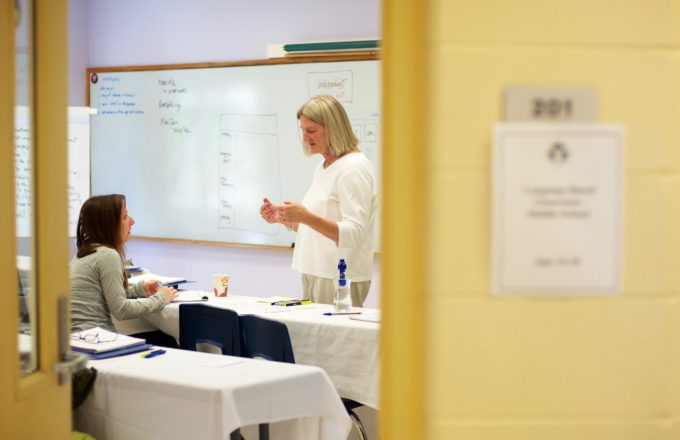September 12, 2018
Q: My students frequently ask to take notes on an iPad or their computer. Do you think this helps or hinders their ability to remember or absorb information? How do you think technology is impacting student literacy?
A: Districts often ask our thoughts on the use of iPads and computers for reading and taking notes. We consistently and respectfully push them to consider the benefits of how students interact with that technology and how the use of traditional tools such as paper and pencil/pen may better facilitate learning. More and more, we’re hearing teachers of all students, not just those who struggle, that they are returning to printed text and using traditional note-taking strategies.
We feel empowered through the work of Maryanne Wolf as evident by the following article. She was also featured on Radio Boston speaking on the same topic. Also, we often refer to this resource that highlights the powerful impact of handwritten notes.
Q: As a middle school teacher, I struggle to know how much support to give students around materials management. I want my students to be independent, but some of them need me to do a lot to keep themselves organized. I’m afraid if I do too much they won’t learn the skills they need to succeed when they get to high school. Any suggestions?
A: This balancing act of providing support, while promoting independence can be tricky. Whether materials are paper/pencil or tech-based, here are some key points to keep in mind:
This resource provides some ideas to get you started in helping students get and stay organized.
Q: I like to use “turn-and-talk” and “think-pair-share” to engage my students in discussions with classmates. I think it gives them an opportunity to share what they are thinking on particular class concepts and learn from each other. However, as I walk around, I notice that some of my students with LBLD are not participating. I’ve realized that just asking to them “share what you think” isn’t enough. What can I do to be sure all students, including those with expressive language deficits, can benefit from these discussion formats?
A: As noted, just telling students that they “have to talk” isn’t enough. First of all, be sure the expectations have been explicitly taught and reviewed. Also, require the students to refer to any related resources. For example, if they just completed documenting observations on a template in a science class make sure they are referring to that sheet to generate ideas. Another suggestion is to provide sentence starters such as “I’m wondering…” or “I’m thinking…”. These are also sometimes referred to as Talk Moves. Check out this video from the Teaching Channel on using Talk Moves. Lastly, the pairs and groups should be carefully planned. Consider students’ strengths and areas of need. Observe the students interacting and change the groupings as needed. Here is an additional resource on how powerful and important social interaction is in learning.
Q: I understand that some students in my classes might have a reading disability, but how is this the same or different from a language-based learning disability (LBLD)?
A: When you think about language, reading is one of the domains that we work with in the classroom. However, when a student struggles with one domain of language, they could also struggle with others, since all the domains of language are connected. Students with LBLDs will most likely be challenged in more than one area, including reading, writing, speaking and/or listening. Here is a great resource to help better understand the basics of a language based learning disabilities. Often (but not always), a student with dyslexia, for example, might not only find grade-level reading materials challenging to read or comprehend, but they also might struggle to organize their thoughts on paper, volunteer on-topic responses in class, or even attend and listen to longer period of lectures.
Q: I have found that sometimes students can compensate for learning disabilities/differences in the classroom when they are younger, but as they move through grades it continues to get more and more challenging for them? Why is this?
A: As students progress through grades in school, the language demand increases, the expectation of independence is higher, and the focus of learning shifts from skills to content. Also, consider how the language demands increase each year in terms of pace (how quickly we move), volume (how much we are asking students to do) and complexity (how difficult the material is for students to grasp). All of these factors together weaken the effectiveness of previously used compensation strategies. To best support these students, it is beneficial to try to incorporate explicit instruction of study skills into the curriculum. Here is a link to several study skills teaching strategies created by Landmark Outreach.
Q: I keep hearing the terms “language processing” being brought up with my students. What is a language processing disorder?
A: According to the Learning Disabilities Association of America, a language process disorder is a specific type of Auditory Processing Disorder (APD). While an APD affects the interpretation of all sounds coming into the brain (e.g., processing sound in noisy backgrounds or the sequence of sounds or where they come from), a Language Processing Disorder (LPD) relates only to the processing of language. LPD can affect expressive language (what you say) and/or receptive language (how you understand what others say).
Some common characteristics of a LPD are:
If you suspect a student you work with has a LPD, talk to your supervisor, a member of your Special Ed team, or your school SLP. Check out this article from Understood.org for more about APD and this article from LDA to understand more about LPD.



